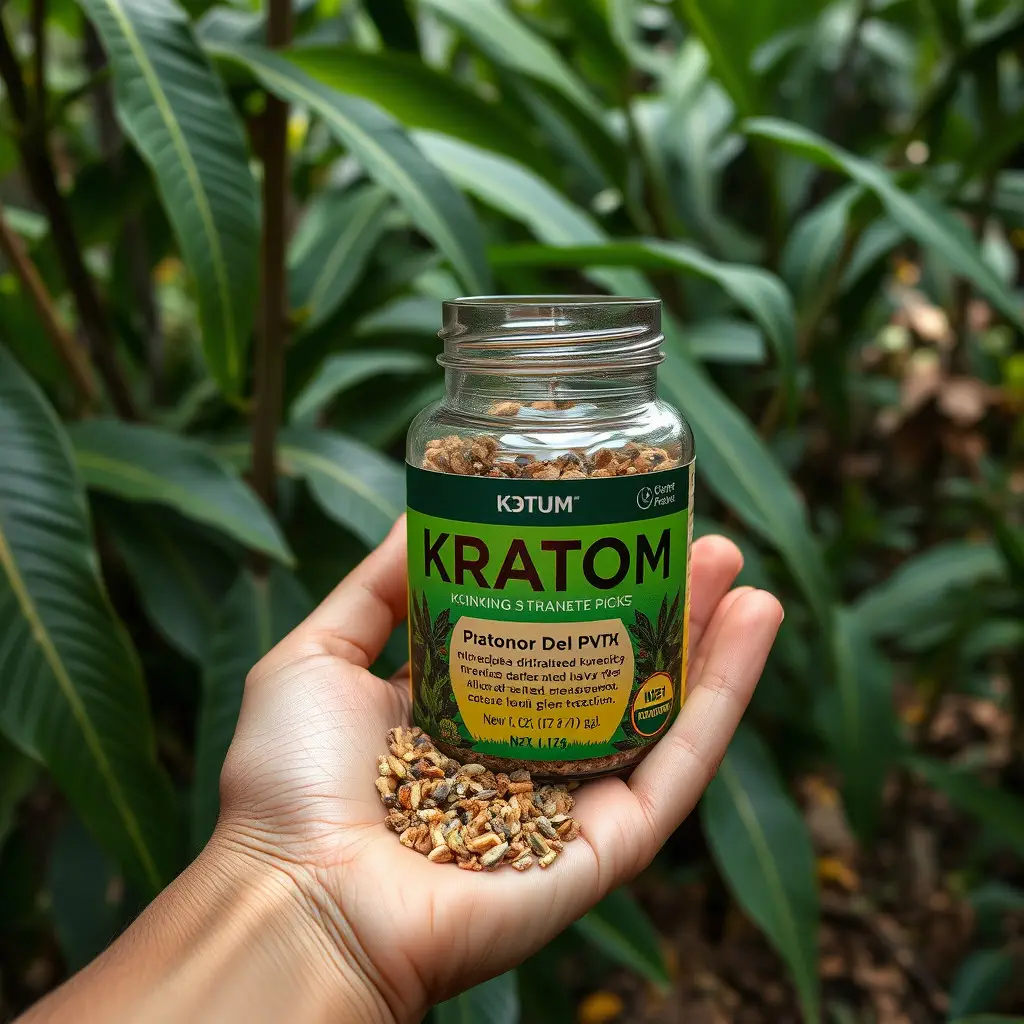Kratom, derived from Southeast Asian plants, contains alkaloids like mitragynine and 7-hydroxymitragynine that can enhance energy levels by stimulating brain receptors. While it's touted as a natural alternative to traditional stimulants, it has been linked to constipation in adults, particularly with increased dose frequency. This gastrointestinal side effect is concerning and necessitates careful consideration for those who may experience digestive slowdowns and subsequent bowel issues. The potential for individual variation in response to kratom means that its effects can vary significantly. For those exploring kratom for energy, it's crucial to be aware of this risk and to consider the importance of seeking medical advice before use, especially if one has gastrointestinal conditions or is on other medications. Alternatively, natural remedies such as American and Asian ginseng, Rhodiola rosea, peppermint oil, and chamomile can offer energy boosts and digestive health benefits without the same risks associated with kratom use. These alternatives are worth considering for anyone concerned about potential constipation from kratom or seeking a safe approach to maintaining vitality and gastrointestinal well-being.
Exploring the intersection of natural wellness and energy optimization, this article delves into the effects of kratom on vitality and its potential impact on gastrointestinal health, particularly addressing concerns around whether kratom causes constipation in adults. We will scrutinize the science behind kratom’s influence on energy levels and investigate natural alternatives that can offer similar invigorating effects while safeguarding digestive well-being. Join us as we navigate this intricate landscape of herbal remedies, ensuring a comprehensive understanding of the relationship between kratom, energy dynamics, and intestinal function.
- Unveiling the Impact of Kratom on Energy Levels and Constipation Risks
- Natural Alternatives to Kratom for Energy Enhancement and Digestive Health
- Understanding the Science Behind Kratom, Energy, and Gastrointestinal Function
Unveiling the Impact of Kratom on Energy Levels and Constipation Risks
Kratom, a plant from Southeast Asia with leaves that contain compounds known as alkaloids, has garnered attention for its potential impact on energy levels in adults. The primary alkaloids found in kratom are mitragynine and 7-hydroxymitragynine, which have been reported to stimulate the brain similar to certain stimulants. Users often turn to kratom as a natural energy booster, claiming it helps to alleviate fatigue and enhance mental clarity. The effects of kratom on energy can vary depending on the dose and strain; lower doses are known to produce stimulating effects, while higher doses may have sedative properties. However, it’s important for adults to consider that individual responses to kratom can differ significantly due to factors like metabolism, tolerance, and personal sensitivity.
While the energizing benefits of kratom are well-documented, there is a growing concern regarding its potential side effects, particularly constipation. The mechanism by which kratom might cause constipation in adults is not fully understood but may be related to its effect on opioid receptors in the gastrointestinal tract. Reports suggest that long-term use of kratom can slow down digestion and disrupt bowel movements, leading to constipation. It’s crucial for individuals considering kratom as an energy booster to be aware of this risk, especially since chronic constipation can have significant health implications. To mitigate this issue, some users advocate for a balanced intake of fluids and fiber-rich foods or the use of gentle laxatives when necessary. It’s advisable for adults to consult healthcare professionals before incorporating kratom into their routine, particularly if they have pre-existing gastrointestinal conditions or are taking medications that could interact with kratom’s effects.
Natural Alternatives to Kratom for Energy Enhancement and Digestive Health

For those seeking natural energy boosters that do not include kratom, a variety of alternatives can be effective and safer for long-term use. Ginseng, both American and Asian varieties, has been used for centuries to enhance vitality and combat fatigue. It is known to modulate neurotransmitters in the brain, promoting improved mental clarity and focus. Additionally, ginseng has a positive impact on blood sugar regulation, immune system function, and overall well-being. Another natural option is Rhodiola rosea, an adaptogen that helps the body resist physical, chemical, and environmental stressors. It has been studied for its role in reducing fatigue and improving mental performance in individuals who experience tiredness, particularly those exposed to high levels of stress.
Regarding digestive health, certain herbs and supplements can support gastrointestinal function without the potential side effects associated with kratom, such as the concern of does kratom cause constipation in adults. Peppermint oil is well-known for its soothing properties on the gastrointestinal tract. It can alleviate symptoms of irritable bowel syndrome and indigestion due to its antispasmodic qualities. Chamomile, a gentle herb, has been traditionally used to aid digestion and can help reduce intestinal gas, relieve abdominal pain, and ease inflammation within the gut. These natural alternatives offer a holistic approach to energy enhancement and digestive health without the risks often associated with kratom use.
Understanding the Science Behind Kratom, Energy, and Gastrointestinal Function

Kratom, a tropical evergreen tree native to Southeast Asia, has been the subject of increasing interest due to its potential effects on energy levels and gastrointestinal function in adults. The scientific community is actively researching the active compounds found in kratom leaves, known as mitragynine and 7-hydroxymitragynine, which are thought to interact with various receptors within the brain, influencing neurotransmitters such as serotonin and norepinephrine. These interactions can lead to an uplifting of mood and a noticeable boost in energy. The stimulant properties of kratom are believed to be responsible for this increase in vigor, making it a popular choice among individuals seeking natural energy enhancement without the jittery side effects often associated with caffeine or other synthetic stimulants.
However, it is important to consider the gastrointestinal implications when discussing the use of kratom. The alkaloids present in kratom leaves can have varying effects on the digestive system. While some users report that kratom aids digestion and eases discomfort, there is evidence to suggest that it may also cause constipation in adults. This contrasting effect on gastrointestinal function necessitates careful consideration of dosage and frequency of use. Research indicates that high doses or frequent consumption of kratom can lead to gastrointestinal distress, including constipation. Therefore, individuals interested in exploring kratom as a natural energy booster should approach its use with caution, mindful of both the potential benefits and possible adverse effects on their digestive health.
In conclusion, the exploration of natural energy boosters, particularly kratom, reveals a complex interplay between its effects on vitality and the potential risks such as constipation, as discussed under “Unveiling the Impact of Kratom on Energy Levels and Constipation Risks.” While kratom may offer an energy lift for some, it is crucial to weigh this against the gastrointestinal implications. Alternative natural methods to enhance energy and promote digestive health, detailed in “Natural Alternatives to Kratom for Energy Enhancement and Digestive Health,” provide safer options for those seeking a boost without the risks. Understanding the science behind kratom’s influence on energy metabolism and gastrointestinal function, as covered in “Understanding the Science Behind Kratom, Energy, and Gastrointestinal Function,” is essential for informed decision-making regarding its use. Ultimately, individuals should approach kratom with caution, considering both its benefits and potential adverse effects like constipation, which are important factors to understand before integration into one’s health regimen.






